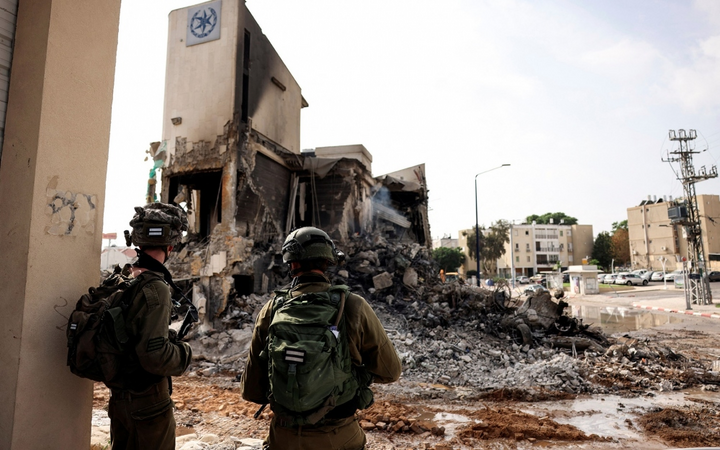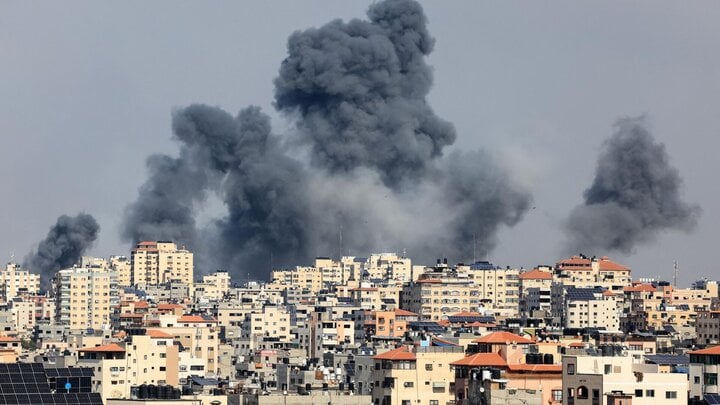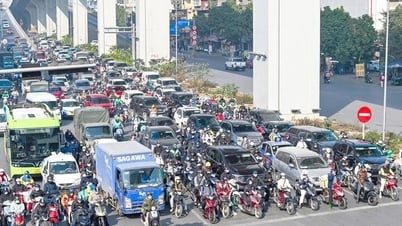Israeli Prime Minister Netayahu said that “the country is in a state of war”, and vowed to make the enemy “pay an unprecedented price”. Over the weekend, Israel launched an attack on Gaza called “Iron Sword” targeting Hamas forces in Palestine.
Initial statistics show that more than 4,000 people have been killed and injured on both sides. Yesterday (October 8), the United Nations Security Council had to hold an emergency meeting to prevent the escalation of violence in the Gaza Strip.
What international analysts are concerned about now is that a large-scale all-out war between Israel and Hamas (Palestine) will quickly break out in the Middle East with long-term consequences that will negatively affect the region.

Israeli soldiers look at the ruins of a police station where clashes with Hamas gunmen took place in southern Israel on October 8. (Photo: Reuters)
What's going on between Israel and Palestine
On the morning of October 7, the armed wing of the Hamas Islamist movement in the Gaza Strip, called the al-Qassam Suicide Brigades, suddenly launched a large-scale attack on southern Israel. The group launched thousands of homemade rockets at many cities and towns deep inside Israeli territory, before deploying hundreds of gunmen to infiltrate across the border and capture dozens of settlements bordering the Gaza Strip.
This is the largest and most daring attack by Hamas deep into Israeli territory since the Gaza Strip was returned to Palestinians in 2005.
The Israeli military responded with dozens of consecutive airstrikes on targets in the Gaza Strip, while cutting off all electricity to the enclave. At home, Israel ordered the mobilization of thousands of reservists, and deployed reinforcements from the northern border to the south to support.
The Israeli government also declared a nationwide state of emergency and later officially confirmed that the country was in a state of war.
With what has been happening, many people believe that a real war is breaking out in Israel and the Gaza Strip. And its initial consequences, as we know, have left more than 4,000 people dead and injured on both sides in just over a day of fighting.
The number of casualties was so large that it shocked not only Palestinians or Israelis, but the international community as well.
Hamas' real intentions
The tough actions of both sides are expected to increase the number of casualties. In a latest statement, the Israeli army affirmed that Hamas made a serious mistake in launching a war against Israel and that the movement will pay a heavy price.
What makes public opinion question is that the Hamas movement's sudden attack on Israel seems to have been pre-planned and they probably anticipated the consequences of this action.
There have been many comments, assessments, and explanations from regional and international analysts about the real motives and purposes behind Hamas's sudden and bold attack on Israel.
Most analyses believe that the attack was not a spontaneous act by Hamas, but a carefully planned and meticulously executed plan with careful calculation and close coordination among the participating forces.
Experts believe that Hamas is fully aware of Israel's reaction and its consequences, because the bloody confrontation between the two sides has not just begun, but has lasted for decades with hundreds of clashes causing casualties.
In the past, no attack by Hamas or any other armed group against Israel has gone unanswered, and the response has often been fierce and the consequences have been many times more severe than the damage caused by the initial attack.
And in fact, in several statements over the past two days, Hamas leaders have also affirmed that the force has prepared a response plan for any scenario of Israeli retaliation, including large-scale infantry deployment into Gaza.
However, it can be affirmed that Hamas also fully understands that with the current balance of power and actual context, they are completely incapable of "liberating" any more territory occupied by Israel.
Therefore, this attack by Hamas is basically only of political significance, and cannot fundamentally change the situation on the ground.
In particular, the most important message that Hamas wants to convey to the Arab and Muslim world is the need to maintain faith in the ability to defeat Israel in the future, to move towards "liberating" all occupied territories of not only Palestinians, but all Arabs and Muslims.
The attack also aimed at Hamas' immediate goal of stopping Israel's increasing repression of Palestinians, while pressuring Israel to release thousands of Islamist militants it is holding in prison, through a prisoner exchange. In addition, many opinions also said that Hamas wants the international community not to forget, but to pay due attention to the Palestinian issue.
Risk of bloody violence in the coming days
Public opinion is concerned that an extremely bloody wave of violence could erupt in Gaza in the coming days, similar to the 11-day war in the Gaza Strip in 2021 that left hundreds dead and injured.
Observers and public opinion in the region are extremely concerned about the risk of violence continuing to escalate and erupting into a full-scale war in the region. There are many grounds to support this concern.

Is this attack by Hamas only political?
First, as we have just mentioned, in the history of confrontation between Israel and Hamas or any other armed group in the region, Israel has always responded very strongly to any act of aggression. In cases where hostilities result in casualties against Israelis, the losses suffered by the aggressor are usually much heavier than what they cause to Israel.
And in fact, on the morning of October 7, Israel responded by launching a massive airstrike campaign against a series of targets in Gaza, killing and injuring more than 2,000 people (as of the night of October 8). On October 8, the Israeli government officially declared that the country was in a state of war, and affirmed that it would conduct more military operations in Gaza in the coming days.
In that context, across the northern border of Israel, Hezbollah forces in Lebanon responded to Hamas' call, launching artillery attacks on the Israeli-occupied Shebaa region of Lebanon.
The attack prompted an immediate response from the Israeli military, heightening tensions in the region and prompting many to speculate about a scenario in which Israel might have to deal with two hostile fronts at the same time.
This scenario would make the war situation in the Middle East extremely complicated and unpredictable, especially after a Hamas leader yesterday declared that they received great support from Iran in this attack on Israel.
However, some comments say that there is still a chance to restore the situation in the region. Because, Israel must carefully consider the next military action to first ensure the safety of the hostages, which are believed to have reached hundreds, that Hamas is holding in the attack on the morning of October 7.
Next is to avoid inciting hostility towards Arabs and Muslims in the region, especially after the incident in which an Egyptian police officer shot and killed two Israeli tourists on the afternoon of October 8, although the actual reason behind this action is still unclear.
In addition, many countries in the region and the world are also making efforts to cool down tensions and prevent the risk of the entire Middle East region sinking into a new spiral of bloody violence with unpredictable consequences.
In the face of escalating tensions in the Gaza Strip, the international community has called on all parties to end the violence. United Nations Special Envoy for the Middle East Tor Wennesland called the situation “on the brink of danger,” calling on all parties to exercise maximum restraint and protect civilians.
Meanwhile, the United Nations High Commissioner for Human Rights Volker Tuerk has called on all parties to immediately stop acts of violence to avoid further bloodshed.
Ba Thi (VOV-Cairo)
Source







































































































Comment (0)